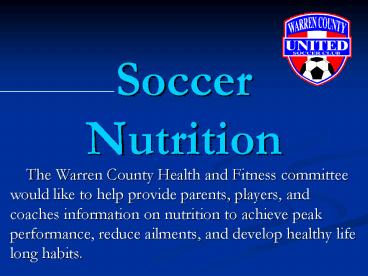Soccer Nutrition - PowerPoint PPT Presentation
1 / 12
Title:
Soccer Nutrition
Description:
There is a wide range of differing nutritional needs of athletes ... Blueberry muffins* English muffins. Corn flakes. Cold cereal* i.e. chex mix. Juice boxes ... – PowerPoint PPT presentation
Number of Views:342
Avg rating:3.0/5.0
Title: Soccer Nutrition
1
Soccer Nutrition
- The Warren County Health and Fitness
committee would like to help provide parents,
players, and coaches information on nutrition to
achieve peak performance, reduce ailments, and
develop healthy life long habits.
2
There is a wide range of differing
nutritional needs of athletes depending upon the
sport they are playing. Soccer athletes require
a complex carbohydrate, low fat, low protein diet
and lots of fluids. Have you ever witnessed
your son, daughter or another player running out
of steam during the second half of the game? This
is often not the result of a lack of fitness but
a lack of energy. In fact, it is most likely
caused by the lack of carbohydrates in the days
leading up to the match.
3
Why should soccer players eat foods that are high
in carbohydrates?
Carbohydrates are the most efficient fuel for
energy production. They are stored as glycogen
in the muscles and liver and are readily
available as an energy source when called
upon. They are most beneficial when engaged in
strenuous exercise. Foods that contain high
carbohydrate contents are grains, cereals,
bread, crackers, rolls, pasta (all kinds),
rice, muffins, bagels, fruit, low fat yogurt
and starchy vegetables.
4
Lets identify some of those peak performance
eating routines. What should the players eat and
drink before, during, and after the
game?
5
PRE GAME
Several days before
and especially the night before a game the meals
should consist of complex carbohydrate,
low fat, and low protein meals. No more
than 10 of all calories should come from
protein. Cut down on meats, eggs, and
nuts. Soccer players also want to eat
2 to 3 hours before a game and avoid foods
that have a high fat content or are high in
calories because they slow down the
digestive process. Food such as butter,
margarine, mayonnaise, salad dressings,
cream cheese, gravies, sauces, and fried foods.
Also soccer players need to cut down on
high protein and high fat foods such as fish,
meats, poultry, cheese, milk (unless its
skim), nuts and seeds.
6
Eating a pre-game meal that is light and low
fat will speed the emptying of the
stomach. Having to digest food in your
stomach at game time will divert energy
from muscles leading to early fatigue.
A breakfast containing fruit, waffles or
pancakes, cereal, and bagels should be
consumed over sausage, bacon, or eggs.
7
HYDRATION
- Proper hydration before a game is just as
important. Water is the best liquid to drink to
replenish lost fluids. The trick is to keep the
body well hydrated and drink before you get
thirsty. If you feel thirsty then you are already
dehydrated. The pre-game rule of thumb is 16 to
20 ounces of water 2 hrs before the game. Ten to
fifteen minutes before the game drink 12 to 14 oz
of a sports drink. Avoid carbonated drinks as
they contain caffeine and cause dehydration and
the carbonated bubbles make it hard to digest
before playing.
8
DURING the GAME
- Obviously the soccer players will not be eating
during the game but hydration is crucial. Sports
drinks such as Gatorade and PowerAde are glucose
based and instantly give carbohydrates as well as
replenish electrolytes lost during the game.
Research states that they help to avoid fatigue
and cramps better than water. Suggestions are 12
to 14 oz during halftime and sips in between. The
warmer the weather the more you should drink.
9
AFTER the GAME
- Keep drinking!! This helps to get rid of toxins
that have built up during the game or practice
for that matter. A beverage high in sugar is
necessary immediately after each game. Sports
drinks are not necessarily high in sugar. Be sure
to read the labels. Avoid eating right away.
Follow up with a healthy meal at least 1 and a
half to 2 hours after the game to give the body
time to repair itself rather than digest a meal.
Avoid carbonated drinks as these may fill up the
stomach and prevent the player from drinking
adequate fluids.
10
TOURNAMENTS
- Tournament games often play havoc with the
players eating and drinking schedules. Try to
follow the pre-game and post game suggestions
outline above to achieve their peak performances
during game time. For the in between games that
occur in the same day be sure to come prepared
with high carbohydrate, low fat and low protein
foods. Stay away from burgers, hot dogs, chips,
fries and nachos as these may take hours to
digest.
11
Here are some suggestions on what to eat during
soccer tournaments. These are easy to carry and
wont spoil!
- Soccer tournament snack foods high
carbohydrate content - Apples
- Bananas
- Dried banana chips
- Apricots
- Raisins
- Fig Newton cookies
- Graham crackers
- Granola bars
- Bagels
- Hard pretzels
- Fruit snacks
- Blueberry muffins
- English muffins
- Corn flakes
- Cold cereal i.e. chex mix
- Juice boxes
- Candy-clear kind like gummies avoid chocolate
(high fat calories)
12
- We hope this information will be helpful to
assist the soccer player in your life in
achieving their peak performances during
practice, game times, and tournaments. - The Warren County Health and Fitness
Committee

